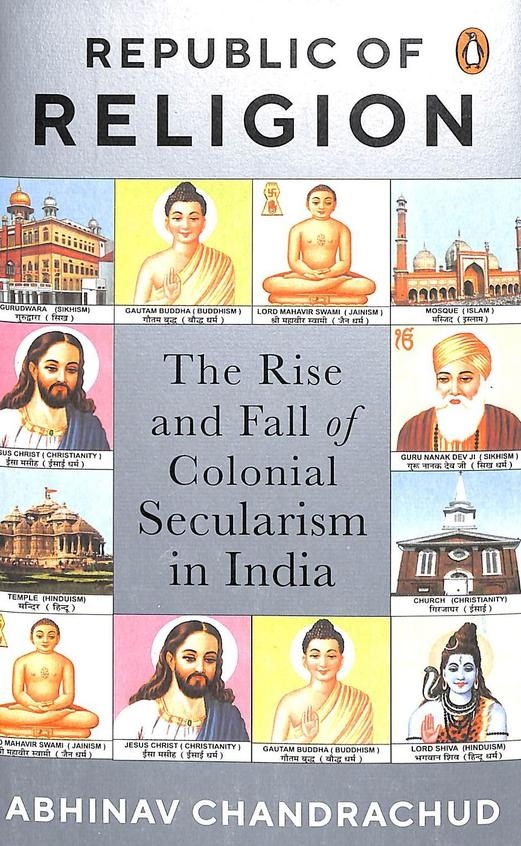
Digression from Secularism Rooted in British ‘Divide and Rule’ Policy
Book review by: M A Siraj
The book under review by Abhinav Chandrachud, a Harvard Law School graduate, digs into the history of secularism in India and argues that secularism was artificially imposed by the British colonial administration in India even though England itself did not follow secular ethos sufficiently. Christianity was official religion of England and required the King or Queen mandatorily to be Protestant Christian. The sovereign was deemed to be ‘Defender of the Faith’ (read Christianity). Archbishops of Canterbury are appointed by the Government. A senior bishop sits in the House of Lords. King or Queen is crowned by a senior member of the clergy. The question that he raises is: If India derives so many of her laws and institutions from England, how is it that there is no established religion in India?
But upon arrival in India, the British were faced with wide array of religions, Hinduism, Islam, Christianity, Sikhism and several denominations of them. Imposition of Christianity would have made India ungovernable. Choice of one of the native religions would have antagonized the followers of several other faiths. So they decided to separate religion from the State. This was discernible at several levels, i.e., 1- The colonial administration would not endorse any particular faith or get itself entangled with one among them. 2- They removed the word ‘God’ from the words of oaths administered to public officials. 3- They provided ‘heightened protection’ to the religious minorities, often feeding into a sense of paranoia (leaving out personal laws from intervention was one of the measures). 4- The Government tacitly encouraged Christian missionaries to preach Christianity and to obtain converts through a Hindu or Muslim preacher. The last one, if done in England, could have attracted criminal prosecution.
Macaulay advocated ‘secular education’, although there was no secular education in England. The British considered native religions like Hinduism, Islam or Sikhism as ‘heathen’ and their followers ‘gentiles’. Creation of Benares Hindu University (1915) and Aligarh Muslim University (1920) was a new turn and outcome of an afterthought. Some among the relevant communities made them believe that ‘these will produce men who…. will be true to their God and the King and their country’. There was a subtext to it. Education in exclusive institutions would deepen the religious schisms. From then on religious binaries came to be reinforced through tools like Census, although back in England, Census forms had no column for religions. Fuzzy lines of differentiation began to etch sharper till they got solidified into watertight compartments. Colonial secularism began to gather contours of ‘divide and rule’ policy. In the 1911 Census, some two lakh people had described themselves as ‘Mohammedan Hindus’. Girasia Rajputs would have two names, one Hindu and one Muslim.
The author dubs the colonial secularism ‘imperial hypocrisy’. What they avoided doing at home was applied in India with impunity. Communal electorate—Hindus voting for Hindu candidates and Muslims voting for their own folk— was brought in under the garb of protecting the minorities. There were countless such measures that were designed to accentuate communal boundaries. Several nationalist leaders singularly held separate communal electorates to be responsible for the eventual Partition of the Indian subcontinent.
Although the British had firmly laid the foundation of communal identities, the political leaders, parties and courts contributed to it their own bit. In 2011, the Gujarat High Court held that ‘bhoomi pujan’ prior to the foundationlaying ceremony of the High Court building was not antithetical to the secular Constitution. Courts now regularly ask if a particular practice is essential feature of a religion to adjudicate on issues that impinge on official policy as could be seen in the recent Hijab issue. But it was the same court which said that the Syedna’s (leader of the Dawoodi Bohra community, a sect within the Shia Muslims) power to excommunicate someone from the community was an essential part of the religion. In yet another case, the apex court held that the followers of Sri Aurobindo were not a religious denomination, ‘since his teachings were a philosophy, not a religion’.
The author elaborately dissects the court directives on Article 44 of the Constitution that says ‘the State shall endeavor to introduce a Uniform Civil Code (UCC)’. He charts the twists and turns the courts have made on the interventions made into personal laws through rulings that have run counter to each other. In the much debated Shah Bano Case (1986) the apex court said section 125 of the Criminal Procedure Cod
 English daily published in Bengaluru & Doha
English daily published in Bengaluru & Doha






